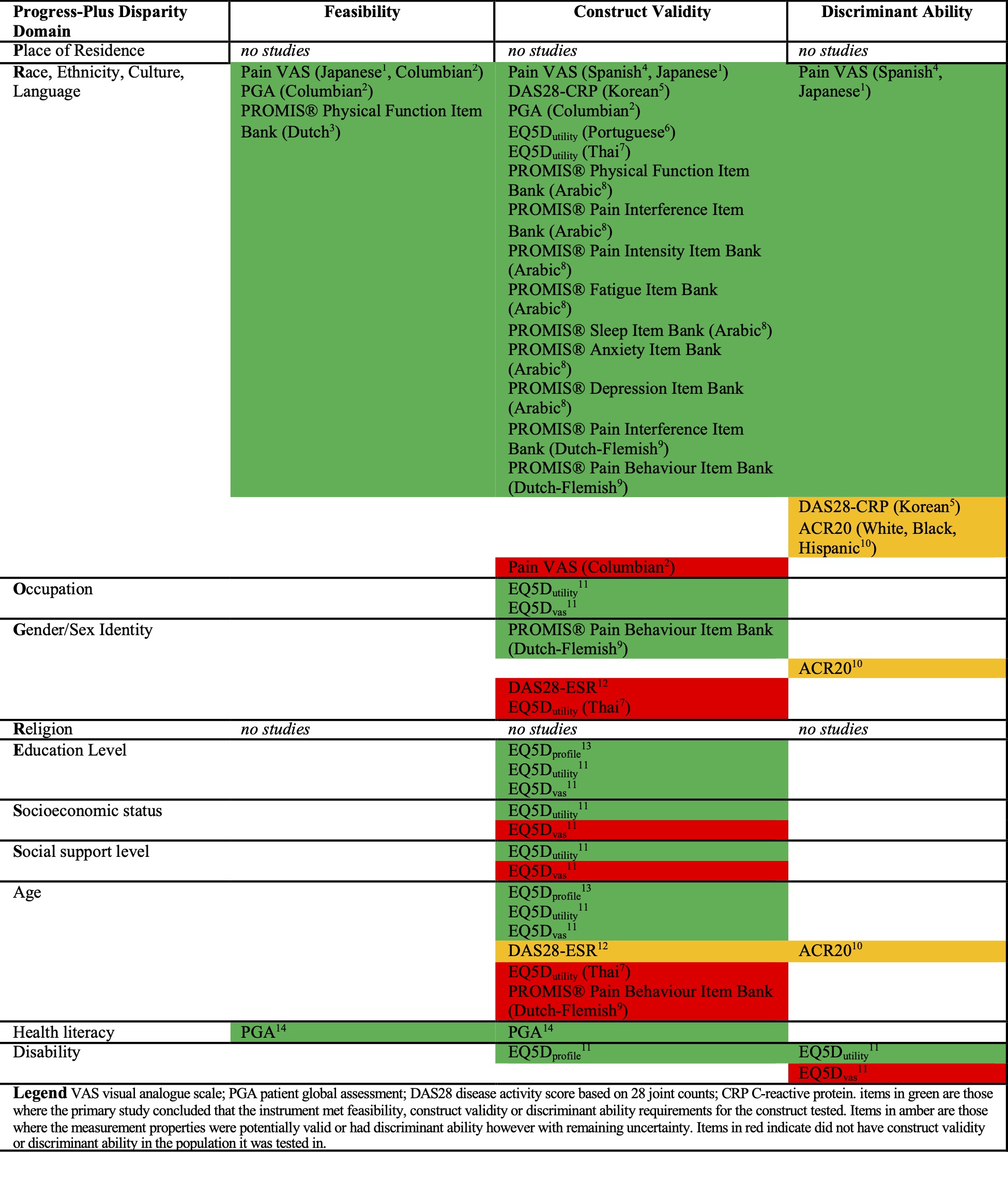Session Information
Session Type: Poster Session B
Session Time: 8:30AM-10:30AM
Background/Purpose: Existing patient-reported outcome measures (PROMs) in rheumatoid arthritis (RA) may be limited in their applicability to populations that experience inequities. We conducted a systematic review to identify validation studies for PROMs in populations at risk for inequity.
Methods: A systematic review of MEDLINE and EMBASE was completed. The search strategy was developed to identify measurement property studies for PROMs of interest (selected pain, disease activity, global evaluation and quality of life scales) in patients with RA. We identified experimental, observational, and qualitative studies reporting analysis of feasibility, construct validity and discriminant ability metrics for populations at risk for inequity by various factors including race, ethnicity, culture or language; employment status; gender and sex identity; education level; socioeconomic status; social support; age; health literacy and disability. A narrative synthesis was conducted.
Results: From 19,786 titles and abstracts screened, we identified 14 unique studies reporting validation metrics for pain (n=3), DAS28-ESR or DAS28-CRP (n=2), ACR20 (n=1), patient global assessment (n=2), EQ5D (n=4), and PROMIS® (n=3) by race (n=10 studies), age (n=6 studies), sex and gender identity (n=5 studies), education level (n=2 studies), and disability, literacy, employment status, social support level and socioeconomic status (n=1 study each). Most studies reported construct validity metrics (n=13), with 5 studies reporting on feasibility and 3 studies reporting on discriminant validity metrics. A visual summary of results is presented in the OMERACT Summary of Measurement Properties (SOMP)-Equity Extension table (Table 1). Overall, studies by culture or language demonstrated good measurement property metrics. There was significantly limited assessment of measurement property metrics for other populations at risk for inequity.
Conclusion: Our study highlights important gaps in patient representation in rheumatology research for accepted patient-reported outcome measures. New PROMs being developed for research and clinical practice should ensure and report representation of patients from populations facing inequities in the testing of metrics of feasibility, construct validity and discriminant ability.
To cite this abstract in AMA style:
Barnabe C, Wattiaux A, Petkovic J, Beaton D, Shea B, Greer-Smith R, Humphreys J, Bartels C, Tugwell P, Umaefulam V. Validation Studies of Rheumatoid Arthritis Patient-Reported Outcome Measures in Diverse Populations at Risk for Inequity: A Systematic Review [abstract]. Arthritis Rheumatol. 2021; 73 (suppl 9). https://acrabstracts.org/abstract/validation-studies-of-rheumatoid-arthritis-patient-reported-outcome-measures-in-diverse-populations-at-risk-for-inequity-a-systematic-review/. Accessed .« Back to ACR Convergence 2021
ACR Meeting Abstracts - https://acrabstracts.org/abstract/validation-studies-of-rheumatoid-arthritis-patient-reported-outcome-measures-in-diverse-populations-at-risk-for-inequity-a-systematic-review/

